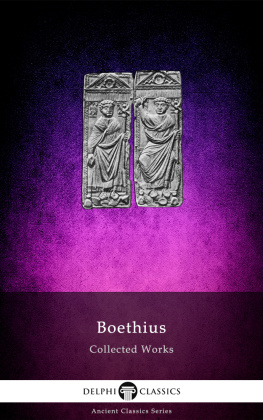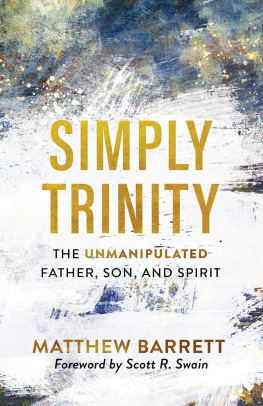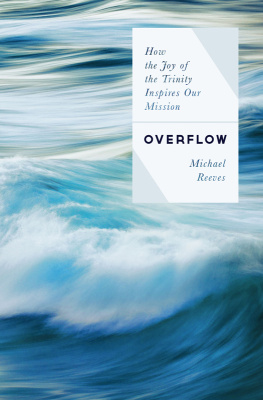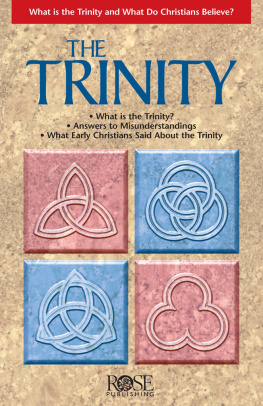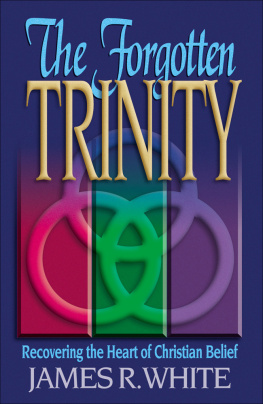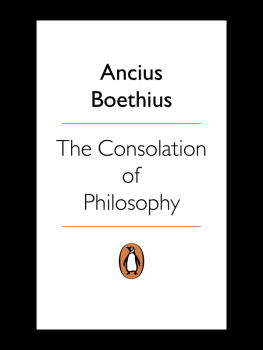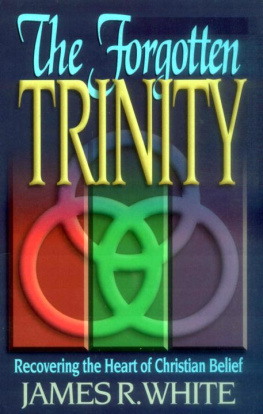Boethius - The Trinity is One God Not Three Gods
Here you can read online Boethius - The Trinity is One God Not Three Gods full text of the book (entire story) in english for free. Download pdf and epub, get meaning, cover and reviews about this ebook. year: 1902, publisher: Christian Classics Ethereal Library (CCEL), genre: Science. Description of the work, (preface) as well as reviews are available. Best literature library LitArk.com created for fans of good reading and offers a wide selection of genres:
Romance novel
Science fiction
Adventure
Detective
Science
History
Home and family
Prose
Art
Politics
Computer
Non-fiction
Religion
Business
Children
Humor
Choose a favorite category and find really read worthwhile books. Enjoy immersion in the world of imagination, feel the emotions of the characters or learn something new for yourself, make an fascinating discovery.
The Trinity is One God Not Three Gods: summary, description and annotation
We offer to read an annotation, description, summary or preface (depends on what the author of the book "The Trinity is One God Not Three Gods" wrote himself). If you haven't found the necessary information about the book — write in the comments, we will try to find it.
The Trinity is One God Not Three Gods — read online for free the complete book (whole text) full work
Below is the text of the book, divided by pages. System saving the place of the last page read, allows you to conveniently read the book "The Trinity is One God Not Three Gods" online for free, without having to search again every time where you left off. Put a bookmark, and you can go to the page where you finished reading at any time.
Font size:
Interval:
Bookmark:

 The Trinity is One God Not Three GodsAuthor(s): Boethius Publisher: Christian Classics Ethereal Library, Grand Rapids, MI Description: Boethius life and works form the bridge between classical philosophy and medieval theology. In this treatise, Boethius sets out to articulate the orthodox teaching of the Trinity philosophically, simultaneously defending it against possible heresies. Arianism, one of the most well-known, widespread, and controversial heresies, receives particular attention. His views on the Trinity reflect his background in Platonic and Aristotelian thought, a background which subsequent Chris tian philosophers and theologians, such as Thomas Aquinas, would inherit. This particular treatise is often read as a sup plement to Boethius still popular and influential work The Consolation of Philosophy. Kathleen OBannon CCEL Staff Subjects: Doctrinal theology God Doctrine of the Trinity i Contents ii
The Trinity is One God Not Three GodsAuthor(s): Boethius Publisher: Christian Classics Ethereal Library, Grand Rapids, MI Description: Boethius life and works form the bridge between classical philosophy and medieval theology. In this treatise, Boethius sets out to articulate the orthodox teaching of the Trinity philosophically, simultaneously defending it against possible heresies. Arianism, one of the most well-known, widespread, and controversial heresies, receives particular attention. His views on the Trinity reflect his background in Platonic and Aristotelian thought, a background which subsequent Chris tian philosophers and theologians, such as Thomas Aquinas, would inherit. This particular treatise is often read as a sup plement to Boethius still popular and influential work The Consolation of Philosophy. Kathleen OBannon CCEL Staff Subjects: Doctrinal theology God Doctrine of the Trinity i Contents ii  This PDF file is from the Christian Classics Ethereal The mission of the CCEL is to make classic Christian books available to the world.
This PDF file is from the Christian Classics Ethereal The mission of the CCEL is to make classic Christian books available to the world.
This book is available in PDF, HTML, and other formats. See Discuss this book online at The CCEL makes CDs of classic Christian literature available around the world through the Web and through CDs. We have distributed thousands of such CDs free in developing countries. If you are in a developing country and would like to receive a free CD, please send a request by email to . The Christian Classics Ethereal Library is a self supporting non-profit organization at Calvin College. If you wish to give of your time or money to support the CCEL, please visit .
This PDF file is copyrighted by the Christian Classics Ethereal Library. It may be freely copied for non-commercial purposes as long as it is not modified. All other rights are re served. Written permission is required for commercial use. iii  Title PageTitle PageTHE TRINITY IS ONE GODNOT THREE GODSA TREATISE BY ANICIUS MANLIUS SEVERINUS BOETHIUS MOST HONOURABLE, OF THE ILLUS TRIOUS ORDER OF EX-CONSULS, PATRICIAN TO HIS FATHER-IN-LAW, QUINTUS AURELIUS MEMMIUS SYMMACHUS MOST HONOURABLE, OF THE ILLUSTRIOUS ORDER OF EX-CONSULS, PATRICIAN Note on the TextNote on the TextNOTE ON THE TEXT IN preparing the text of the Consolatio I have used the apparatus in Peiper's edition (Teubner, 1871), since his reports, as I know in the case of the Tegernseensis, are generally accurate and complete; I have depended also on my own collations or excerpts from various of the important manuscripts, nearly all of which I have at least examined, and I have also followed, not always but usually, the opinions of Engelbrecht in his admirable article, DieConsolatio Philosophiae des Boethius in the Sitzungsberichte of the Vienna Academy, cxliv. (1902) 160.
Title PageTitle PageTHE TRINITY IS ONE GODNOT THREE GODSA TREATISE BY ANICIUS MANLIUS SEVERINUS BOETHIUS MOST HONOURABLE, OF THE ILLUS TRIOUS ORDER OF EX-CONSULS, PATRICIAN TO HIS FATHER-IN-LAW, QUINTUS AURELIUS MEMMIUS SYMMACHUS MOST HONOURABLE, OF THE ILLUSTRIOUS ORDER OF EX-CONSULS, PATRICIAN Note on the TextNote on the TextNOTE ON THE TEXT IN preparing the text of the Consolatio I have used the apparatus in Peiper's edition (Teubner, 1871), since his reports, as I know in the case of the Tegernseensis, are generally accurate and complete; I have depended also on my own collations or excerpts from various of the important manuscripts, nearly all of which I have at least examined, and I have also followed, not always but usually, the opinions of Engelbrecht in his admirable article, DieConsolatio Philosophiae des Boethius in the Sitzungsberichte of the Vienna Academy, cxliv. (1902) 160.
The present text, then, has been constructed from only part of the material with which an editor should reckon, though the reader may at least assume that every reading in the text has, unless otherwise stated, the authority of some manuscript of the ninth or tenth century; in certain orthographical details, evidence from the text of the Opuscula Sacra has been used without special mention of this fact. We look to August En gelbrecht for the first critical edition of the Consolatio at, we hope, no distant date. The text of the Opuscula Sacra is based on my own collations of all the important ma nuscripts of these works. An edition with complete apparatus criticis will be ready before long for the Vienna corpis Scriptorum Ecclesiasticorum Latinorum. The history of the text of the Opuscula Sacra, as I shall attempt to show elsewhere, is intimately connected with that of the Consolatio. E. K. IntroductionIntroductionINTRODUCTION ANICIUS MANLIUS SEVERINUS BOETHIUS, of the famous Praenestine family of the Anicii, was born about 480 A.D. in Rome. in Rome.
His father was an ex-consul; he himself was consul under Theodoric the Ostrogoth in 510, and his two sons, children of a great grand daughter of the renowned Q. Aurelius Symmachus, were joint consuls in 522. His public career was splendid and honourable, as befitted a man of his race, attainments, and character. But he fell under the displeasure of Theodoric, and was charged with conspiring to deliver Rome from his rule, and with corresponding treasonably to this end with Justin, Emperor of the East. He was thrown into prison at Pavia, where he wrote the Consolation of Philosophy, and he was as brutally put to death in 524. His brief and busy life was marked by great literary achievement.
His learning was vast, his industry untiring, his object unattainablenothing less than the transmission to his countrymen of all the works of Plato and Aristotle, and the reconciliation of their apparently divergent views. To form the idea was a silent judgment on the learning of his day; to realize it was more than one man could accomplish; but Boethius accomplished much. He translated the E of Porphyry, and the whole of Aristotle's Organon. He wrote a double commentary on the E, and commentaries on the Categories and the De Interpretatione of Aristotle, and on the Topica of Cicero. He also composed original treatises on the categorical and hypothetical syllogism, on Division and on Topical Differences. He adapted the arithmetic of Nicomachus, and his textbook on music, founded on various Greek authorities, was in use at Oxford and Cambridge until modern times.
His five theological Tractates are here, together with the Consolation of Philosophy to speak for themselves. Boethius was the last of the Roman philosophers and the first of the scholastic theolo gians. The present volume serves to prove the truth of both these assertions. The Consolation of Philosophy is indeed, as Gibbon called it, "a golden volume, not un worthy of the leisure of Plato or of Tully." To belittle its originality and sincerity, as is sometimes done, with view to saving the Christianity of the writer, is to misunderstand his mind and his method. The Consolatio is not, as has been maintained, a mere patchwork of translations from Aristotle and the Neoplatonists. Rather it is the supreme essay of one who throughout his life had found his highest solace in the dry light of reason.
His chief source of refreshment, in the dungeon to which his beloved library had not accompanied him, was a memory well stocked with the poetry and thought of former days. The development of the argument is anything but Neoplatonic; it is all his own. And if the Consolation of Philosophy admits Boethius to the company of Cicero or even of Plato, the theological Tractates mark him as the forerunner of St. Thomas. It was the habit of a former generation to regard Boethius as an eclectic, the transmitter of a distorted Aristotelianism, a pagan, or at best a luke-warm Christian, who at the end cast off the faith Introduction which he had worn in times of peace, and wrapped himself in the philosophic cloak which properly belonged to him. The authenticity of the Tractates was freely denied.
We know better now. The discovery by Alfred Holder, and the illuminating discussion by Hermann Usener,1 of a fragment of Cassiodorus are sufficient confirmation of the manuscript tradition, apart from the work of scholars who have sought to justify that tradition from internal evidence. In that fragment Cassiodorus definitely ascribes to his friend Boethius "a book on the Trinity, some dogmatic chapters, and a book against Nestorius."2 Boethius was without doubt a Christian, a Doctor and perhaps a martyr. Nor is it necessary to think that, when in prison, he put away his faith. If it is asked why the
Next pageFont size:
Interval:
Bookmark:
Similar books «The Trinity is One God Not Three Gods»
Look at similar books to The Trinity is One God Not Three Gods. We have selected literature similar in name and meaning in the hope of providing readers with more options to find new, interesting, not yet read works.
Discussion, reviews of the book The Trinity is One God Not Three Gods and just readers' own opinions. Leave your comments, write what you think about the work, its meaning or the main characters. Specify what exactly you liked and what you didn't like, and why you think so.





